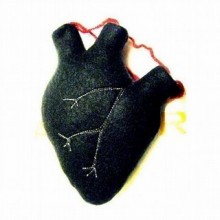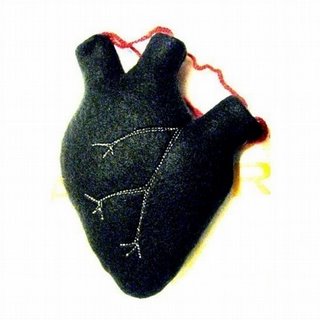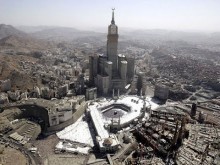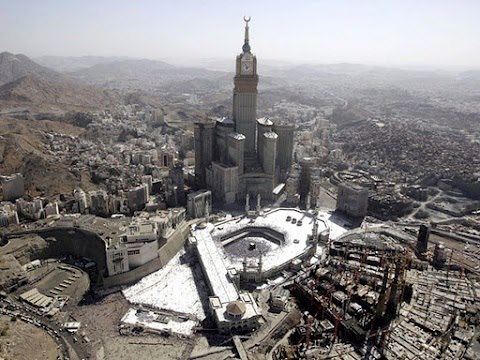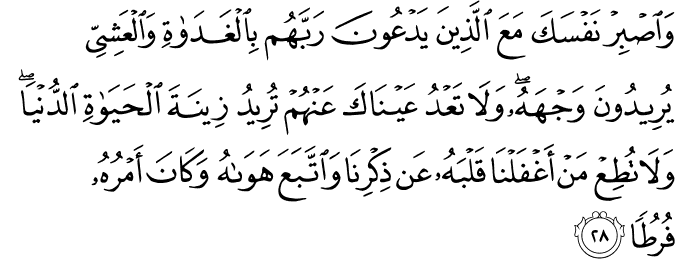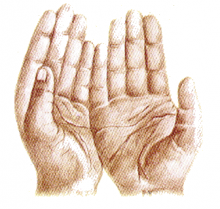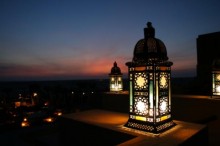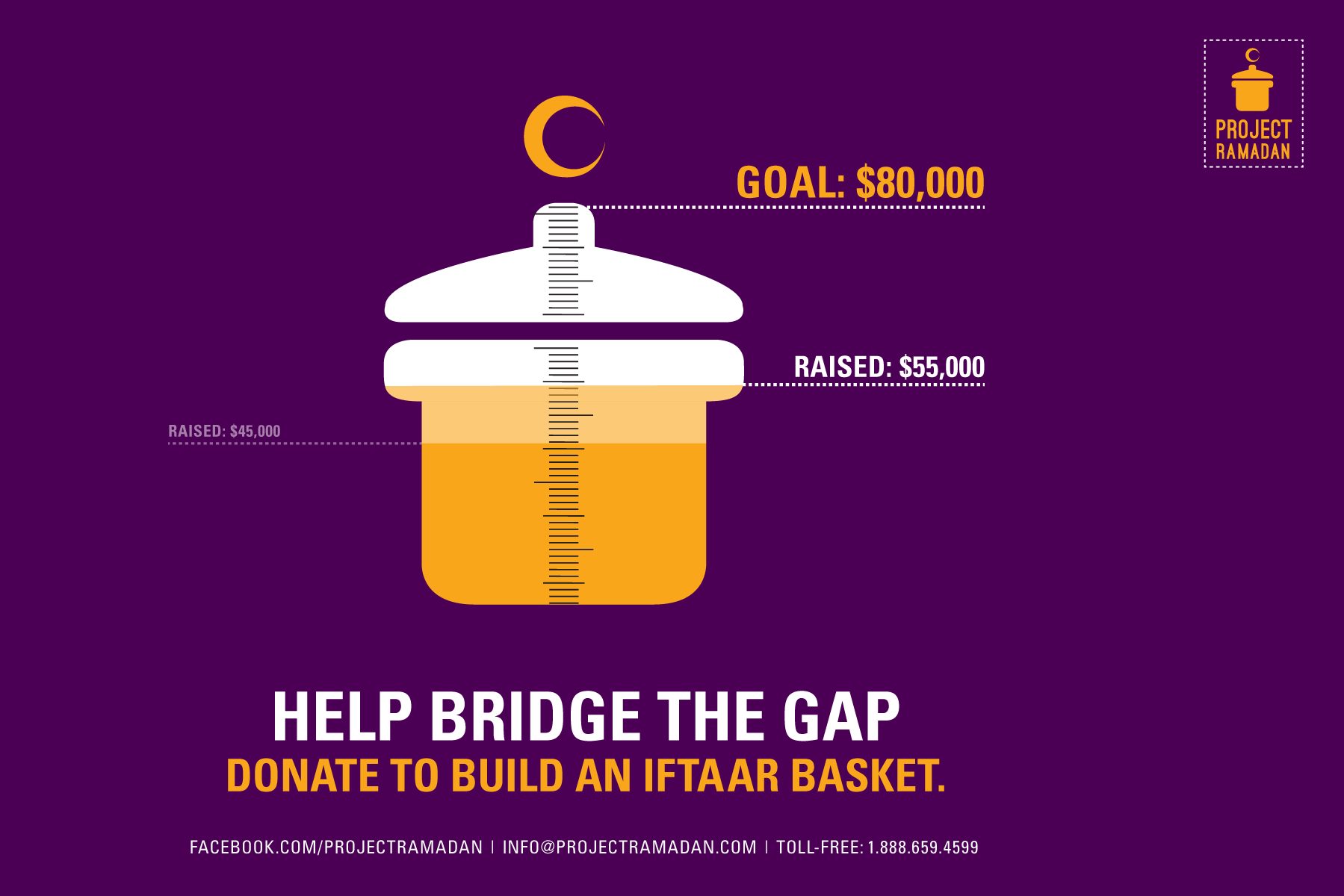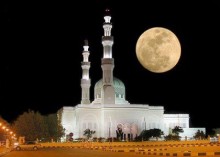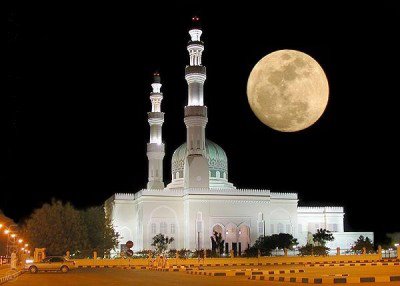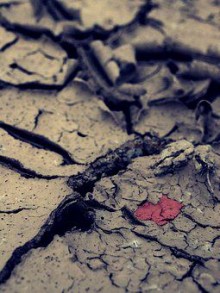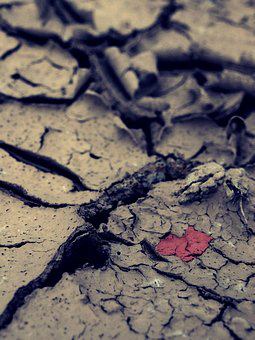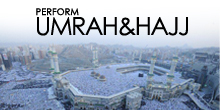In each of the daily prayer we offer, we solemnly declare to Allah, “Iyyaka na’budu” (You alone do we worship). While the intelligent and committed believer realizes that his very lifestyle spells worship, he knows, remembering the words of our Prophet sallAllahu ‘alayhi wa sallam that “Du’aa’ (supplication) is worship” [Tirmidhi, Abu Dawud]
Allah, the Most Merciful, has encouraged the believers to take advantage of certain times during the year to make du’aa’. Such an occasion presents itself annually during Ramadan — especially on the Laylat ul-Qadr, the Night of Power. On this night, the single most important event in human history unfolded as, after the Glorious Quran was preserved in the Protected Tablet, Jibril descended with the blessed book to reveal it, upon Allah’s command, to His Messenger sallAllahu ‘alayhi wa sallam. Accentuating its significance, Allah says “and how would you know (the value of the) Night of Qadr” [Surah Al Qadr 97:2]
Photo Courtesy : http://www.flickr.com/photos/somayah-haneef/
“Allah’s Messenger sallAllahu ‘alayhi wa sallam used to exert more (in worship) on the last ten than on other nights.” [Muslim]
So valuable is this Night of Qadr that the Quran devotes a special Surah to it; “Laylat ul-Qadr is better than a thousand months” [Surah Al Qadr 97:3] This one night surpasses the value of 30,000 nights. The most authentic account of the occurrence of the Night indicates that it can occur on any one of the last ten, odd numbered nights of Ramadan. The fact that the exact night is unknown reflects Allah’s will in keeping it hidden. Indeed, the Prophet sallAllahu ‘alayhi wa sallam was prevented from telling us its precise time. One day, he came out to tell the companions the exact night. On the way he saw two men arguing with each other. By the will of Allah, he sallAllahu ‘alayhi wa sallam forgot and subsequently remembered it. Afterwards the Prophet sallAllahu ‘alayhi wa sallam was instructed not to divulge this information. “Had I been allowed,” he sallAllahu ‘alayhi wa sallam remarked once, “I would have told you (of its exact time).” [Ahmad] The Almighty in His wisdom kept this hidden from us for many reasons (wa Allahu ‘Alam). Perhaps He wants us to strive hard in our worship during the last ten days of Ramadan so that we don’t become lazy, worshipping hard on just that one night and denying ourselves the benefit of doing the same on the other nights. “Had people not left their salah except for that (one) night, I would have informed you (of its exact date).” [Al-Tabarani]
The sincere believer who worries day and night about his sins and phases of neglect in his life patiently awaits the onset of Ramadan. During it he hopes to be forgiven by Allah for past sins, knowing that the Prophet sallAllahu ‘alayhi wa sallam promised that all who bear down during the last ten days shall have all their sins forgiven. To achieve this, he remembers the Prophet’s sallAllahu ‘alayhi wa sallam advice in different sayings wherein he used words like “seek”, “pursue”, “search”, and “look hard” for Laylat ul-Qadr. Moreover, Allah and His Prophet sallAllahu ‘alayhi wa sallam provided us some signs of its occurrence.
Allah subhanahu wa ta’ala describes the night as “..peace until the rise of the morn.” [Surah Al Qadr 97:5] In various sayings, the Prophet sallAllahu ‘alayhi wa sallam described the night as serene, tranquil, and peaceful. The sun at sunrise would appear reddish and without its normal blazing and sharp rays. Ubayy radiAllahu ‘anhu said : “On the morning of the night of Qadr the sun would rise without any beams; (it is like) a wash basin until it raises.” [Muslim]
Abu Hurairah radiAllahu ‘anhu said : “We mentioned the night of Qadr to the Messenger of Allah (sallAllahu ‘alayhi wa sallam) and he said: “Which of you remembers when the moon rises and it is like half a bowl.” [Muslim]
Ibn Abbaas radiAllahu ‘anhu said that the Messenger of Allah (sallAllahu ‘alayhi wa sallam) said : “The night of Qadr is a night of generosity and happiness, it is not hot and neither is it cold. The sun comes up in its morning weak, reddish.” [Tabaranee, Ibn Khuzaimah and Bazzaar]
The Prophet sallAllahu ‘alayhi wa sallam added that “the angel of earth on that night of Qadr will be more numerous than all the pebbles of the earth.”
What should one do during the last ten days in pursuit of Laylat ul-Qadr?
The devoted servant of Allah makes these nights alive with prayer, reading and reflecting on Quran. The long qiyaam prayer has been particularly recommended during the nights on which Laylat ul-Qadr could fall. This is indicated in many hadeeths, such as the following:
Abu Tharr (radhiAllahu `anhu) relates: “We fasted with Allah’s Messenger sallAllahu ‘alayhi wa sallam in Ramadan. He did not lead us (in qiyaam) at all until there were seven (nights of Ramadan) left. Then he stood with us (that night – in prayer) until one third of the night had passed. He did not pray with us on the sixth. On the fifth night, he prayed with us until half of the night had passed. So we said, ‘Allah’s Messenger! Wouldn’t you pray with us the whole night?’ He replied:
‘Whoever stands in prayer with the imaam until he (the imaam) concludes the prayer, it is recorded for him that he prayed the whole night.’…” [Recorded by Ibn Abi Shaybah, Abu Dawud, at-Tirmithi (who authenticated it), an-Nasa’i, Ibn Majah, at-Tahawi (in Sharhu Ma`an il-Athar, Ibn Nasr, al-Faryabi, and al-Bayhaqi. Their isnad is authentic.]
Abu Dawud mentioned: “I heard Ahmad being asked, ‘Do you like for a man to pray with the people or by himself during Ramadan?’ He replied, ‘Pray with the people’ I also heard him say, ‘I would prefer for one to pray (qiyaam) with the imaam and to pray witr with him as well, for the Prophet (sallAllahu `alayhi wa sallam) said: “When a man prays with the imaam until he concludes, it is recorded that he prayed the rest of that night.” [Masaa’il]]
Abu Hurayrah (radhiAllahu `anhu) narrated that the Messenger sallAllahu ‘alayhi wa sallam said: “Whoever stands (in qiyaam) in Laylat ul-Qadr [and it is facilitated for him] out of faith and expectation (of Allah’s reward), will have all of his previous sins forgiven.” [Al-Bukhari and Muslim; the addition “and it is facilitated for him” is recorded by Ahmad from the report of `Ubaadah Bin as-Samit; it means that he is permitted to be among the sincere worshippers during that blessed night.]
He makes du’aa’ to Allah, penitently beseeching Him for His forgiveness. He is inspired by the Prophet’s sallAllahu ‘alayhi wa sallam words “Our Lord, most Exalted, Most high comes down to the lowest heaven during the last third of each night and announces (reassuringly): Whoever makes du’aa’, I shall answer it. Whoever asks (for something halal) I shall grant it; and whoever seeks forgiveness, I shall forgive him.” [Bukhari] The believer, conscious of Allah and their sins, will continue to beseech Allah, in and out of prayer, during his prostration.
`A’ishah (radhiAllahu `anha) reported that she asked Allah’s Messenger sallAllahu ‘alayhi wa sallam, “O Messenger of Allah! If I knew which night is Laylat ul-Qadr, what should I say during it?” And he instructed her to say:
“Allahumma innaka `afuwwun tuh, ibbul `afwa fa`fu `annee – O Allah! You are forgiving, and you love forgiveness. So forgive me.” [Recorded by Ahmad, Ibn Majah, and at-Tirmithi]
`A’ishah radiAllahu ‘anhu said: “When the (last) ten started, the Prophet sallAllahu ‘alayhi wa sallam would tighten his izaar (i.e. he stayed away from his wives in order to have more time for worship), spend the whole night awake (in prayer), and wake up his family.” [Bukhari and Muslim]
For a time, the only concern will be cleansing oneself of the forgetfulness that this life propagates in one’s heart, the sins that accumulate, darkening the heart, making it insensitive to disobeying Allah. He begs Allah to keep him away from misfortunes in this world, the punishment of the grave, and the torment of Hell. He asks Allah to make him patient and steadfast in struggling to maintain his Islam in this world and asks Him to overlook his shortcomings, periods of laziness and neglect. Sincere devotion on that night will render the believer forgetful of the time, until he is surprised by the Adhan of Fajr. After Fajr, as the sun creeps above the horizon, reddish and weak in its appearance, without any rays, the effort at night will have been worthwhile. The believer rejoices, knowing that this was quite possibly Laylat ul-Qadr and “Whoever stays up (in prayer and remembrance of Allah) on the Night of Qadr fully believing (in Allah’s promise of reward for that night) and hoping to seek reward (from Allah alone and not from people), he shall be forgiven for his past sins.” [Bukhari, Muslim]
It is narrated from `A’ishah radiAllahu ‘anhu that she said: “I said: ‘O Messenger of Allah, if I know what night is the Night of Qadr what should I say?.” He said: “Say: O Allah you are pardoning and you love to pardon so pardon me. “ [Ahmad, Ibn Majah, Tirmidhee]
It is also the Night when all ordainments for the year are decreed. Allah ta’ala said, which means:
“By the manifest Book (the Quran) that makes thing clear. We sent it (this Quran) down on a Blessed Night (i.e. the Night of Qadr) in the month of Ramadan. Verily We are ever warning [mankind that Our Torments will reach those who disbelieve in Our Oneness of Lordship and in Our Oneness of Worship]. Therein (that night) is decreed every matter (amran) of ordainment.” [Surah Al Dukhan 44:2-4]
The virtue of the last ten days of Ramadan and Laylat al-Qadr
Praise be to Allah, the Lord of the Worlds, and peace and blessings be upon the Trustworthy Prophet Muhammad and upon all his family and companions.
The Prophet (peace and blessings of Allah be upon him) used to strive hard (in worship) during the last ten days of Ramadan in a way that he did not strive at any other times. (Muslim, 1175, from `A’ishah)
Among the things he did were secluding himself in I’tikaaf and seeking Laylat al-Qadr during this time. (Al-Bukhari, 1913; Muslim, 1169). In al-Saheehayn it is reported from the hadeeth of `A’ishah (may Allah be pleased with her) that when the last ten days of Ramadan came, the Prophet (peace and blessings of Allah be upon him) would stay up at night, wake his family and gird his loins. (al-Bukhari, 1920; Muslim, 1174). Muslim added: “he strove hard and girded his loins.”
Her phrase “girded his loins” is a metaphor for his preparing himself to worship and strive hard in worship, more than usual. It has the meaning of “rolling up one’s sleeves” to worship (i.e. getting ready to make a great deal of effort).
It was also said that it was a metaphor for keeping away from women and abstaining from sexual relations.
The phrase “stay up at night” means that he would stay awake, spending the night in prayer, etc. It was reported in another hadeeth that `A’ishah (may Allah be pleased with her) said: “I never saw the Prophet (peace and blessings of Allah be upon him) recite the entire Quran in one night, or spend a whole night in prayer until the morning, or fast an entire month, except in Ramadan.” (Sunan al-Nasaa’i, 1641)
The words “stay up at night” may mean that he spent most of the night in worship, or that he did not stay up for the entire night, but he did that at the times of ‘Ishaa and Suhoor, and other times, in which case it would mean that he stayed up for most of the night.
The phrase “and wake his family” means that he would wake his wives to pray qiyaam. It is known that he (peace and blessings of Allah be upon him) used to wake his wives all year round, but he used to wake them to spend part of the night in qiyaam. In Saheeh al-Bukhari it is reported that the Prophet (peace and blessings of Allah be upon him) woke up one night and said, “Subhaan Allah! What tribulations have come down tonight! What treasure has come down tonight! Who will wake up the dwellers of the apartments? There may be women who are clothed in this world and naked in the Hereafter.” (al-Bukhari, 1074)
It was also reported (in Saheeh al-Bukhari) that he (peace and blessings of Allah be upon him) used to wake `A’ishah (may Allah be pleased with her) when he wanted to pray Witr. (al-Bukhari, 952). But when he woke his wives during the last ten nights of Ramadan, this was more persistent than at other times of the year.
The fact that he (peace and blessings of Allah be upon him) did this indicates the importance he attached to worshipping his Lord and making the most of this special time.
The Muslim should follow the example of the Prophet (peace and blessings of Allah be upon him), for he is the best example, and he should strive hard in worshipping Allah. He should not waste the hours of these days and nights. For we do not know, perhaps this time will never come again, for the spoiler of pleasures, i.e., death, which must come to all men, may come and snatch him and his life will end; then he will feel regret at the time when regret will be of no avail.
Among the unique virtues of these special nights is that Laylat al-Qadr is among them. Allah says (interpretation of the meaning):
“Haa-Meem. [These letters are one of the miracles of the Quran and none but Allah (Alone) knows their meanings.]
By the manifest Book (this Quran) that makes things clear.
We sent it (this Quran) down on a blessed night [(i.e. the Night of Al-Qadr) in the month of Ramadan]. Verily, We are ever warning [mankind that Our Torment will reach those who disbelieve in Our Oneness of Lordship and in Our Oneness of worship].
Therein (that night) is decreed every matter of ordainments.
As a Command (or this Quran or the Decree of every matter) from Us. Verily, We are ever sending (the Messengers),
(As) a mercy from your Lord. Verily, He is the All-Hearer, the All-Knower.” [Surah Al Dukhan 44:1-6]
Allah sent down the Quran on this night which the Lord of the Worlds has described as blessed. It was reported from a group of the Salaf – including Ibn ‘Abbaas, Qutaadah, Sa’eed ibn Jubayr, ‘Ikrimah, Mujaahid and others – that the night on which the Quran was sent down was Laylat al-Qadr.
The phrase Therein (that night) is decreed every matter of ordainments means, on that night the destiny of all creatures for the coming year is decreed. On that night it is written who will live, who will die, who will be saved, who will be doomed, who will be destined for Paradise, who will be destined for Hell, who will be granted honour, who will be humiliated, where drought and famine will occur, and everything else that Allah wills in that year.
What is meant by the idea that the destiny of all creatures is written on Laylat al-Qadr is – and Allah knows best – that on Laylat al-Qadr they are transferred from al-Lawh al-Mahfooz. Ibn ‘Abbaas said: “You may see a man furnishing his home or plowing his field, and he is one of those who are going to die,” i.e., it has been decreed on Laylat al-Qadr that he is one of those who are going to die (in the coming year). And it was said that on this night, the destiny of people is shown to the angels.
The meaning of “Qadr” is veneration or honour, i.e. it is a night that is venerated because of its special characteristics, and because the one who stays up during this night becomes a man of honour. And it was said that Qadr means constriction, in the sense that the knowledge of precisely when this night is, is hidden. Al-Khaleel ibn Ahmad said: “it was called Laylat al-Qadr because the earth is constricted by the great numbers of angels on that night, and Qadr means constriction.”
Allah says (interpretation of the meaning): “But when He tries him, restricting his subsistence for him…” [Surah Al Fajr 89:16], i.e., by constricting or reducing his provision.
And it was said that Qadr means Qadar, i.e., that on this night the decrees for the coming year are ordained, as Allah says (interpretation of the meaning):
“Therein (that night) is decreed every matter of ordainments” [Surah Al Dukhan 44:4], and because Allah’s decrees are decided and written down on this night.
So Allah has called it Laylat al-Qadr, because of its great value and high status with Allah, and because so many sins are forgiven and so many faults are concealed during this night. For it is the night of forgiveness, as it was reported in al-Saheehayn from Abu Hurayrah (may Allah be pleased with him) that the Prophet (peace and blessings of Allah be upon him) said: “Whoever stays up during Laylat al-Qadr out of faith and in the hope of earning reward, all his previous sins will be forgiven.” [al-Bukhari, 1910; Muslim, 760]
Allah has given this night special characteristics which make it unique:
1. It is the night on which the Quran was sent down, as we have stated above. Ibn ‘Abbaas and others said: “Allah sent down the Quran at one time from al-Lawh al-Mahfooz to Bayt al-‘Izzah in the first heaven, then it was revealed to the Messenger of Allah (peace and blessings of Allah be upon him) in stages according to events over twenty-three years.” [Tafseer Ibn Kathir, 4/529]
Allah described it as being better than a thousand months, as He said (interpretation of the meaning): “The night of al-Qadr is better than a thousand months” [Surah Al Qadr 97:3]
Allah described it as being blessed, as He said (interpretation of the meaning): “We sent it (this Quran) down on a blessed night” [Surah Al Dukhan 44:3]
On this night, the angels and the Spirit [al-Rooh] descend, “i.e., many angels descend of this night because it is so blessed, and the angels come down when Allah’s blessing and mercy come down, just as they come down when Quran is recited, and they surround the circles of dhikr (gatherings where Allah is remembered), and they beat their wings for the one who sincerely seeks knowledge, out of respect for him.” (See Tafseer Ibn Kathir, 4/531)
The Spirit [al-Rooh] is Jibreel (peace be upon him), who is specifically mentioned in this manner as a sign of respect for him.
This night is described as peace, i.e., it is safe, for the Shaytaan cannot do any evil or cause any harm on this night, as Mujaahid said. (See Tafseer Ibn Kathir, 4/531). On this night, many people are saved from punishment because of what they do to worship Allah, may He be glorified.
“Therein (that night) is decreed every matter of ordainments” [Surah Al Dukhan 44:4 – interpretation of the meaning] , i.e., the affairs of that year are dispatched from al-Lawh al-Mahfooz to the angels who record the decrees: who will live, who will die, what provision people will be given, what will happen until the end of that year, every matter of ordainments is decreed, and it cannot be altered or changed. (See Tafseer Ibn Kathir, 4/137, 138). All of this is already known to Allah before it is even written down, but He makes known to the angels what is to happen, and commands them to do whatever they are enjoined to do. (Sharh Saheeh Muslim li’l-Nawawi, 8/57).
Allah forgives the previous sins of the one who stays up and prays during this night out of faith and in hope of earning the reward from Him. It was reported in the hadeeth of Abu Hurayrah (may Allah be pleased with him) that the Prophet (peace and blessings of Allah be upon him) said: “Whoever fasts the month of Ramadan out of faith and in the hope of earning reward, all his previous sins will be forgiven, and whoever stays up during Laylat al-Qadr out of faith and in the hope of earning reward, all his previous sins will be forgiven.” (Agreed upon). The phrase “out of faith and in the hope of earning reward” means, believing in Allah’s promise of reward for this, and seeking the reward, with no other aim or purpose, such as showing off etc.” [Fath al-Baari, 4/251]
Allah has revealed a surah concerning this night which will be recited until the Day of Resurrection, in which He mentions the honour and great value of this night. This is the surah in which He says (interpretation of the meaning):
“Verily, We have sent it (this Quran) down in the Night of Al-Qadr (Decree).
And what will make you know what the Night of Al-Qadr (Decree) is?
The Night of Al-Qadr (Decree) is better than a thousand months (i.e. worshipping Allah in that night is better than worshipping Him a thousand months, i.e. 83 years and 4 months).
Therein descend the angels and the Rooh [Jibreel] by Allah’s Permission with all Decrees,
(All that night), there is peace (and goodness from Allah to His believing slaves) until the appearance of dawn.” [Surah Al Qadr 97:1-5]
The phrase And what will make you know what the Night of Al-Qadr (Decree) is? serves to draw attention to the importance and great significance of this night.
The Night of Al-Qadr (Decree) is better than a thousand months means, it is better than over eighty three years, as we have already mentioned. This is a great virtue, the value of which no one can fully understand except the Lord of the Worlds, may He be blessed and exalted. This encourages the Muslim to spend this night in prayer and to seek the Face of Allah by doing so. The Prophet (peace and blessings of Allah be upon him) used to seek this night, hoping to gain some good from it, and he is the example for this Ummah.
It is mustahabb to seek it during Ramadan, especially in the last ten nights of the month. It was reported in Saheeh Muslim that Abu Sa’eed al-Khudri (may Allah be pleased with him) said: “the Messenger of Allah (peace and blessings of Allah be upon him) did I’tikaaf during the first ten days of Ramadan, then he did I’tikaaf during the middle ten days in a Turkish tent [the word qubbah, translated here as “tent”, refers to a tent or any circular structure] in which a mat was placed. He said: so he took the mat in his hand and put it at the side of the tent, then he raised his head to speak to the people, so they came closer to him. He said: “I did I’tikaaf during the first ten days, seeking this night, then I did I’tikaaf during the middle ten days. Then someone came to me and told me that it is in the last ten days, so whoever among you wants to do I’tikaaf, let him do so.” So the people did I’tikaaf with him. He said: “I was shown an odd-numbered night, in the morning of which I was prostrating in mud and water”. Then in the morning of the twenty-first, he got up to pray Subh and it was raining; the roof of the mosque leaked, and there was mud and water. He came out when he had finished praying, and there was mud and water on his forehead and nose. That was the morning of the twenty-first, one of the last ten days.” [Saheeh Muslim, 1167]
In a report, Abu Sa’eed said: “It rained on the night of the twenty-first, and the roof of the mosque leaked over the place where the Messenger of Allah (peace and blessings of Allah be upon him) was praying. I looked at him, when he had finished praying Salaat al-Subh, and his face was wet with mud and water.” [Agreed upon].
Muslim narrated a hadeeth from ‘Abd-Allah ibn Unays (may Allah be pleased with him) that was similar to the hadeeth of Abu Sa’eed, except that he said, “it rained on the night of the twenty-third.” According to a hadeeth narrated by Ibn ‘Abbaas (may Allah be pleased with them both), the Prophet (peace and blessings of Allah be upon him) said: “Seek it in the last ten days of Ramadan, when there are nine days left, and seven days left, and five days left.” (Narrated by al-Bukhari, 4/260).
Laylat al-Qadr is in the last ten days of Ramadan, as stated in the hadeeth of Abu Sa’eed quoted above, and as stated in the hadeeth of `A’ishah, and in the hadeeth of Ibn ‘Umar who said that the Prophet (peace and blessings of Allah be upon him) said: “Seek Laylat al-Qadr in the last ten days of Ramadan.”
(The hadeeth of `A’ishah was narrated by al-Bukhaari, 4/259; the hadeeth of Ibn ‘Umar was narrated by Muslim, 2/823. This wording is that of the hadeeth of `A’ishah).
It is more likely to be one of the odd-numbered nights, because of the hadeeth of `A’ishah who said that the Messenger of Allah (peace and blessings of Allah be upon him) said: “Seek Laylat al-Qadr in the odd-numbered nights of the last ten nights.” (Narrated by al-Bukhari, 4/259)
We should seek it especially in the odd-numbered nights, i.e., on the twenty-first, the twenty-third, the twenty-fifth, the twenty-seventh and the twenty-ninth. It was reported in al-Saheehayn that the Prophet (peace and blessings of Allah be upon him) said: “Seek it in the last ten nights, on the odd-numbered nights.” (Narrated by al-Bukhari, 1912, see also, 1913. Also narrated by Muslim, 1167, see also 1165).
According to the hadeeth of Ibn ‘Abbaas (may Allah be pleased with them both), the Prophet (peace and blessings of Allah be upon him) said: “Seek it in the last ten nights of Ramadan, when there are nine left, when there are seven left, when there are five left.” (Narrated by al-Bukhari, 1917-1918). So it is more likely to be one of the odd-numbered nights.
In Saheeh al-Bukhari it was narrated that ‘Ubaadah ibn al-Saamit said: the Prophet (peace and blessings of Allah be upon him) came out to tell us when Laylat al-Qadr was, and two of the Muslims were arguing. He said: “I came out to tell you when Laylat al-Qadr was, and So and so and So and so were arguing, so it [the knowledge of when Laylat al-Qadr was] was taken away from me. Perhaps this is better for you. So seek it on the ninth and the seventh and the fifth” (al-Bukhari, 1919), i.e., on the odd-numbered nights.
This hadeeth indicates how bad it is to argue and fight, especially with regard to matters of religion, and that this is a cause of goodness being taken away or concealed.
Shaykh al-Islam ibn Taymiyah said: “But odd-numbers have to do with what is past [i.e., when one starts counting from the beginning of the month], so it should be sought on the twenty-first, the twenty-third, the twenty-seventh or the twenty-ninth; or it may be with regard to what is left, as the Prophet (peace and blessings of Allah be upon him) said: ‘when there are nine left, or seven left, or five left, or three left.’ On this basis, if the month has thirty days, these will be even-numbered nights, so on the twenty-second there will be nine days left, on the twenty-fourth there will be seven days left. This is how it was explained by Abu Sa’eed al-Khudri in the saheeh hadeeth, and this is how the Prophet (peace and blessings of Allah be upon him) prayed qiyaam during this month. If this is the case, then the believer should seek it in all of the last ten days.” (al-Fataawaa, 25/284, 285)
Laylat al-Qadr is more likely to be in the last seven days. Ibn ‘Umar (may Allah be pleased with him) reported that a man among the companions of the Prophet (peace and blessings of Allah be upon him) was shown Laytal al-Qadr in a dream, and that it was one of the last seven nights. The Messenger of Allah (peace and blessings of Allah be upon him) said: “It seems that your dreams agreed that it is one of the last seven nights, so whoever wants to seek it, let him seek it in the last seven nights.” (narrated by al-Bukhari, 1911; Muslim, 1165). Muslim reported: “Seek it in the last ten nights, and if any of you are weak or unable to do that, then let him not miss the last seven.”
It is most likely to be on the night of the twenty-seventh. It was reported, in a hadeeth narrated by Ahmad from Ibn ‘Umar, and a hadeeth narrated by Abu Dawood from Mu’aawiyah, that the Prophet (peace and blessings of Allah be upon him) said: “Laylat al-Qadr is the night of the twenty-seventh.” (Musnad Ahmad and Sunan Abu Dawood, 1386). The view that it is the night of the twenty-seventh is the opinion of most of the Sahaabah and the majority of scholars, and Ubayy ibn Ka’b (may Allah be pleased with him) used to assert, without saying “inshaAllah”, that it was the night of the twenty-seventh. Zurr ibn Hubaysh said: “I said: What makes you say that, O Abu’l-Mundhir? He said: by the signs of which the Messengers of Allah (peace and blessings of Allah be upon him) told us: that the sun rises that morning with no visible rays.” (Narrated by Muslim,2/268)
Many marfoo’ ahaadeeth were narrated which said that it was on this particular night.
Ibn ‘Abbaas (may Allah be pleased with them both) also stated that it is the night of the twenty-seventh. He reached this conclusion by means of an amazing process. It was reported that ‘Umar (may Allah be pleased with him) gathered the Sahaabah together and included Ibn ‘Abbaas even though he was very young. They said, “Ibn ‘Abbaas is like one of our children. Why have you brought him here with us?” ‘Umar said: “He is a youth who has a good mind and who asks lots of questions.” Then he asked the Sahaabah about Laylat al-Qadr, and they agreed that it was one of the last ten nights of Ramadan. He asked Ibn ‘Abbaas about it, and he said: “I think I know when it is: it is the night of the twenty-seventh.” ‘Umar said, “What makes you think that?” He said, “Allah made the heavens seven, and the earths seven, and the days seven, and He created man from seven, and He made Tawaaf seven (circuits), and al-Saa’ee seven, and the stoning of the Jamaar seven.” So Ibn’ Abbaas thought that it was the night of the twenty-seventh because of this analysis. This has been soundly reported from Ibn ‘Abbaas.
Another of the ways in which the conclusion was reached that it is the night of the twenty-seventh is by noting that the word fihaa (therein) in the aayah (interpretation of the meaning): “Therein descend the angels and the Rooh [Jibreel]” [Surah Al Qadr 97:4] is the twenty-seventh word of Surah al-Qadr [in the original Arabic]
There is no shar’i evidence (daleel) to support this manner of analysis, and there is no need for such calculations, because we have sufficient shar’i evidence available to us.
The fact that it is usually the night of the twenty-seventh – and Allah knows best – does not mean that this is always the case. It could be the night of the twenty-first, as mentioned in the hadeeth of Abu Sa’eed quoted above, or it could be the twenty-third, as mentioned in the report of ‘Abd-Allah ibn Unays (may Allah be pleased with him) quoted above. According to a hadeeth narrated by Ibn ‘Abbaas (may Allah be pleased with them both), the Prophet (peace and blessings of Allah be upon him) said: “Seek it in the last ten days of Ramadan, when there are nine days left, and seven days left, and five days left.” (Narrated by al-Bukhari, 4/260)
Some of the scholars thought that it is more likely that Laylat al-Qadr moves and does not come on a specific night each year. Al-Nawawi (may Allah have mercy on him) said: “This is the apparent meaning because of the conflict between the saheeh ahaadeeth on this matter, and there is no way to reconcile the ahaadeeth apart from saying that Laylat al-Qadr moves.” (al-Majmoo’, 6/450).
Allah has concealed this night so that His slaves will strive to seek it, and will strive hard in worship, just as He has concealed the hour of jumu’ah, and so on.
So the believer should strive hard during the days and nights of these ten days, seeking Laylat al-Qadr and following the example of our Prophet (peace and blessings of Allah be upon him), and he should strive in making du’aa’ and seeking to draw close to Allah.
It was reported that `A’ishah said: “I said, ‘O Messenger of Allah, what do you think, if I witness Laylat al-Qadr, what should I say?’ He said: ‘Say, O Allah, You are Forgiving and Generous, and you love forgiveness, so forgive me.’” (Narrated by Imaam Ahmad, al-Tirmidhi (3515) and Ibn Maajah (3850). Its isnaad is saheeh).
A greater virtue is attached to I’tikaaf on this night than on any other night of the year. I’tikaaf means staying in the mosque to worship Allah, may He be exalted. The Prophet (peace and blessings of Allah be upon him) used to spend these ten days in I’tikaaf, as stated in the hadeeth of Abu Sa’eed quoted above. He spent the first ten days in I’tikaaf, then the middle ten days, then he told them that he had been seeking Laylat al-Qadr, and that he had been shown that it was in the last ten days, and he said: “Whoever was doing I’tikaaf with me, let him do I’tikaaf for the last ten days.” It was reported from `A’ishah (may Allah be pleased with her) that the Prophet (peace and blessings of Allah be upon him) used to do I’tikaaf during the last ten days of Ramadan until he passed away, then his wives did I’tikaaf after him. (Agreed upon). There is also a similar report narrated from Ibn ‘Umar.
When the Prophet (peace and blessings of Allah be upon him) wanted to do I’tikaaf, he would pray Fajr, then enter the place where he was to do I’tikaaf, as was stated in al-Saheehayn from the hadeeth of `A’ishah.
The four imaams and others (may Allah have mercy on them) said that he entered it before the sun set, and they interpreted the hadeeth as meaning that he entered his place of I’tikaaf and kept away from people after Salaat al-Subh, not that this was the time when he started his I’tikaaf. (See Sharh Muslim li’l-Nawawi, 8/68, 69; Fath al-Baari, 4/277).
It is Sunnah for the person in I’tikaaf to keep himself busy with worship, and it is forbidden for him to have intercourse or to do anything that leads to it, because Allah says (interpretation of the meaning): “And do not have sexual relations with them (your wives) while you are in I‘tikaaf (i.e. confining oneself in a mosque for prayers and invocations leaving the worldly activities) in the mosques” [Surah Al Baqarah 2:187]
And he should not go out of the mosque except in the case of a pressing need.
The signs by which Laylat al-Qadr is known
The first sign: it was reported in Saheeh Muslim from the hadeeth of Ubayy ibn Ka’b (may Allah be pleased with him) that the Prophet (peace and blessings of Allah be upon him) announced that one of its signs was that when the sun rose on the following morning, it had no (visible) rays. (Muslim, 762)
The second sign: it was reported from the hadeeth of Ibn ‘Abbaas narrated by Ibn Khuzaimah, and by al-Tayaalisi in his Musnad, with a saheeh isnaad, that the Prophet (peace and blessings of Allah be upon him) said: “Laylat al-Qadr is a pleasant night, neither hot nor cold, and the following day the sun rises red and weak.” (Saheeh Ibn Khuzaymah, 2912; Musnad al-Tayaalisi)
The third sign: it was reported by al-Tabaraani with a hasan isnaad from the hadeeth of Waathilah ibn al-Asqa’ (may Allah be pleased with him) that the Prophet (peace and blessings of Allah be upon him) said: “Laylat al-Qadr is a bright night, neither hot nor cold, in which no meteors are seen.” (Narrated by al-Tabaraani in al-Kabeer. See Majma’ al-Zawaa’id, 3/179; Musnad Ahmad)
These three saheeh ahaadeeth explain the signs which indicate Laylat al-Qadr.
It is not essential for the one who “catches” Laylat al-Qadr to know that he has “caught” it. The point is to strive hard and to be sincere in worship, whether or not one knows that one has “caught” it. It may be that some of those who do not know that may be better with Allah and higher in status than those who did know which night it was, because the former strove hard. We ask Allah to accept our fasting our prayer at night, and to help us to remember Him and to thank Him and to worship Him properly. May Allah bless our Prophet Muhammad.
ORIGINAL ARTICLE
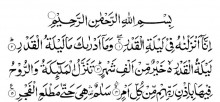
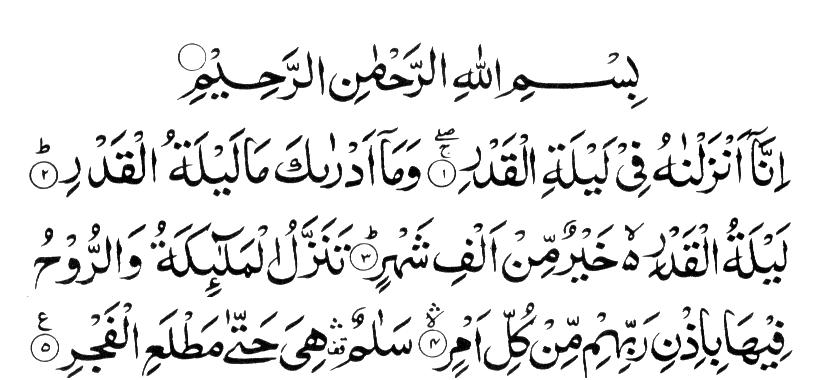

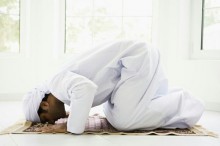







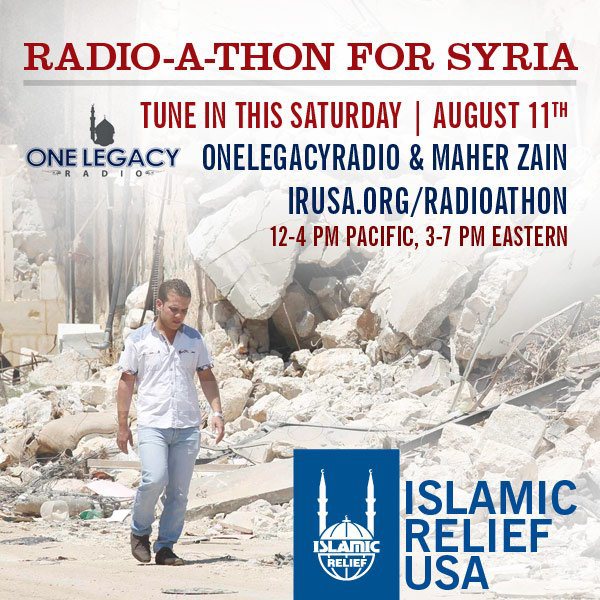 www.irusa.org/radioathon
www.irusa.org/radioathon